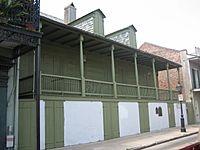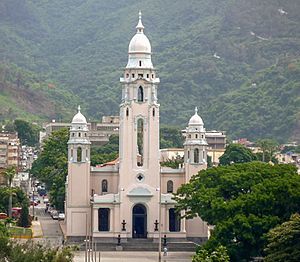Renato Beluche facts for kids
Quick facts for kids
Renato Beluche
|
|
|---|---|

The house where Renato Beluche was born.
|
|
| Born | 15 December 1780 |
| Died | 4 October 1860 (aged 79) Puerto Cabello, Venezuela
|
| Nationality | Venezuelan |
| Other names | Pierre Brugman, Pedro Brugman |
| Occupation | merchant, pirate, privateer |
| Years active | 1805-1850 |
Renato Beluche (born December 15, 1780 – died October 4, 1860) was a Venezuelan sailor and adventurer. He was born in New Orleans, which was then part of Spanish Louisiana. Renato started his career as a merchant (someone who buys and sells goods). Later, he became a pirate and a privateer.
A privateer was like a pirate, but they had permission from a government to attack enemy ships during wartime. Renato was active in the Gulf Coast area in the early 1800s. He spent more than ten years fighting for the independence of countries in Latin America against the Spanish Empire.
During this time, he even helped the United States alongside the famous pirate Jean Lafitte. They worked together to stop a British invasion during the Battle of New Orleans. Even though he served the government of Gran Colombia (a large country that used to include Venezuela), Renato later joined a rebellion against them. Because of this, he was sent away from the country for nine years.
After he returned, he helped the government stop another rebellion. He retired in 1850 and lived peacefully in Puerto Cabello, Venezuela. Ten years after he died, his remains were moved to the National Pantheon of Venezuela, a special place where important national heroes are buried.
Early Life and Adventures
Renato Beluche was born in New Orleans in 1780. His father, René Beluche, was a French immigrant who had a wig-making business. This business was actually a secret way for him to do illegal trade. His father also owned a large farm called a plantation in Chalmette, Louisiana. Renato spent a lot of his early life there.
In 1802, Renato started working on a large warship for the Spanish Navy. By 1805, he had left the navy and became the captain of his own merchant ship, a type of sailing vessel called a schooner.
Around this time, two brothers, Jean Lafitte and Pierre Lafitte, had set up a base for their smuggling business in Barataria Bay on the Louisiana coast. Renato decided to join them. He used the French flag on his ship and captured Spanish and British merchant ships. He would then send these captured ships to different ports, depending on where they were from. There are some ideas that Beluche might have used a different name, like Pierre Brugman or Pedro Brugman. It's possible this was an associate, or maybe even someone who looked a lot like him.
Fighting for Freedom
In 1813, Beluche started working with groups in Gran Colombia who were fighting for their independence from Spanish rule. He received a special document called a letter of marque from Venezuelan general Simón Bolívar. This document gave him permission to attack enemy ships.
Renato spent the next ten years helping these revolutionaries. The only break he took was when he joined Jean Lafitte and the smugglers from Barataria Bay. They helped Andrew Jackson and the United States during the Battle of New Orleans.
After fighting as an artillery commander in the Battle of New Orleans, Beluche went back to help Gran Colombia. He took part in several important battles, including the Aux Cayes Expedition, the Battle of Lake Maracaibo, and the Siege of Puerto Cabello in 1823.
In 1824, Beluche settled his family in Puerto Cabello. After the Spanish were forced out of Gran Colombia, he worked as a captain, moving goods along the coast. In 1836, Beluche joined a group that rebelled against the Venezuelan government, but his side lost. Because of this, he was exiled, meaning he had to leave the country for nine years.
He returned in 1845 and helped the government stop another revolt that lasted from 1848 until 1850.
Later Life and Legacy

For the next ten years, Beluche lived a quiet life, very different from his adventurous earlier years. He died peacefully in Puerto Cabello in 1860. A century after he passed away, on July 22, 1963, Renato Beluche's remains were moved to the National Pantheon of Venezuela. This is a special honor for important figures in Venezuelan history.
See also
 In Spanish: Renato Beluche para niños
In Spanish: Renato Beluche para niños
 | Tommie Smith |
 | Simone Manuel |
 | Shani Davis |
 | Simone Biles |
 | Alice Coachman |

